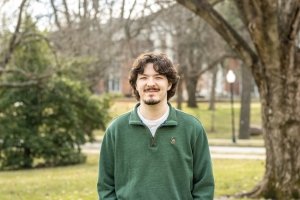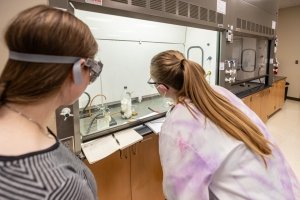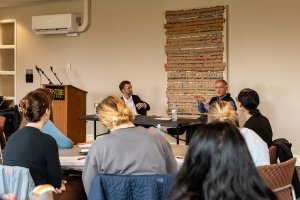Students dive into Tahitian culture during immersive summer course
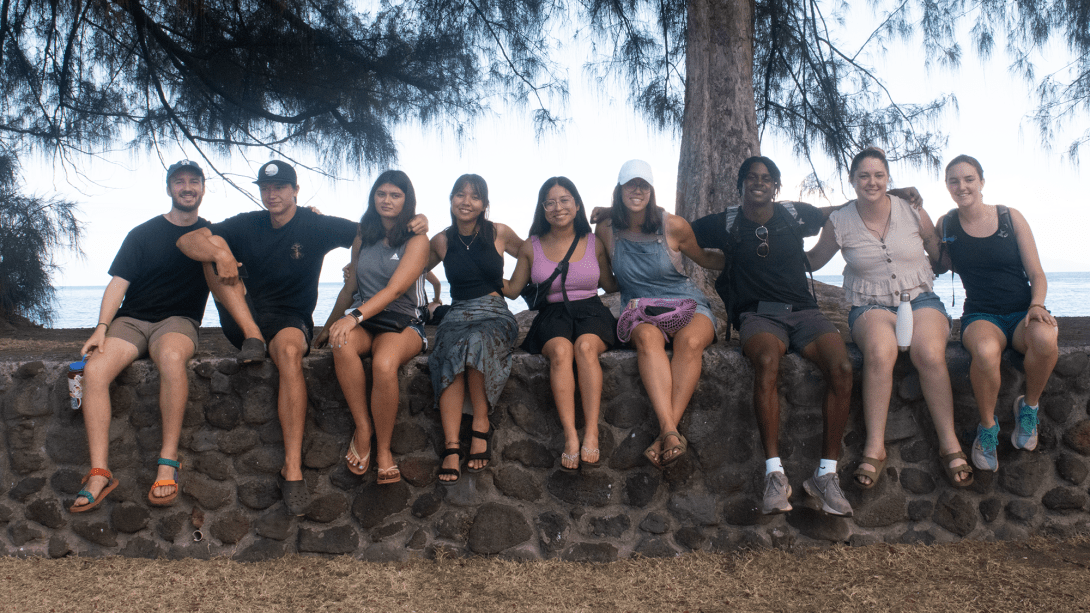
One of the best ways to endear yourself to a new culture? Try new things.
Students in the Centre College J. David Grissom Intensive Language Course did just that this summer, studying French in Tahiti with professors Marc Démont and Christian Wood while immersing themselves in the Tahitian culture. Students toured art museums, explored the island and ate local cuisine — including fafaru, a distinctive dish that smells of rotten fish.
Those types of experiences were what Wood and Démont, French and humanities instructors at Centre College, envisioned when they thought of the course more than five years ago. Their goal was to create a cultural immersion program through a performing arts framework.
Students this summer were able to take in the Heiva Festival in Tahiti — the largest festival of its kind on the Pacific island, where locals perform dances and play ancestral sports, promoting Tahitian identity.
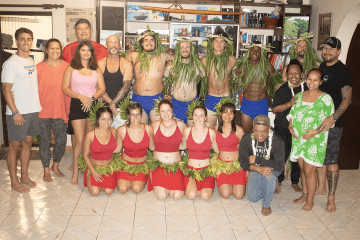
“(Students) were shy at the beginning, but that curiosity shines through,” Démont said. “People are receptive to it, people want to answer. For me, it was an enormous breakthrough for students — (they could ask about) culture in the making, not just in the book.”
Such an immersion program helps students better learn the everyday usage of a language — particularly when it’s not the home country for the language.
“When you start learning a language, you have to start with a standard language,” Démont said. “So, students are used to the standardized French, but there are many French languages, many accents and different vocabularies … People can mix words from another language, and I think it helps dissociate the language with the geographic country of France.
“Learning a language is opinion-less. Being able to use it and realize (students) can understand, they can communicate and do things in that language in another part of the world, it’s extremely rewarding for them.”
For rising junior Philippe N’Dia, the trip was monumental because of his family’s ties to the Ivory Coast in Africa — he lived there for seven years and has frequently visited.
“With this course, I wanted to really experience another French speaking country, especially on another side of the world that I have never been to. I wanted to look at the differences between Tahiti and the Ivory Coast and see how French colonization changed both of those countries.”
Part of what makes the Tahitian course unique is Wood’s ties to the island — he has family there. He noted that the three-week course provided students an excellent opportunity to contextualize what they were learning, from Tahitian history to French language, and more.
“If students are willing to get out of their comfort zone, knowing that there is a network there to help them if they need it, what they learn oftentimes happens at any time of the day, and without a very specific (schedule),” Wood said.
Wood noted one challenge that students face when speaking with residents about culture: They might be apprehensive or even intimidated about asking questions because they want to phrase it correctly. Which is problematic, Wood said, because questions help build bridges and break barriers.
Una Mijatovic ’23 noted that the Tahitians she spoke with were incredibly open. As a graduate ready to tackle a Fulbright fellowship in France this fall, she went into the course as a “field research opportunity.”
“In Tahiti, they really value the community over the individual. We were coming into their space as foreigners, but they were so willing to talk to us as long as we showed an ounce of interest.”
Mijatovic said she asked the group’s dance teacher — another performing arts aspect of the course — about his interest in teaching American students.
“He said, ‘We do this, because we love our culture.’ I feel like that goes for everything that they do. They want to highlight and showcase their culture as much as they can,” she said. “I learned a lot — I probably learned the most just from having conversations with locals.”
One primary example of going “all-in” during the Tahitian course was the group’s willingness to try fafaru — a traditional Tahitian dish that serves fermented fish with coconut milk.
“The thing that made the group so special was everyone was a ‘yes person’ the whole time we were there,” Mijatovic said. “’Do you want to go on a hike and potentially get wet and potentially have to swim during some parts of the hike?’ Unanimous ‘yes.’ Do you want to try fafaru, the raw fish dish? Everyone said yes. It was just sort of this mentality.”
”I’m going to be honest, I was kind of stupid and ended up eating it without dipping it in the coconut milk. Big mistake. It’s really smelly,” N’Dia said.
But it was those moments that made the group connect with the Tahitian culture in a way that wouldn’t have otherwise been possible.
“They want you to learn about their culture, so you can spread that knowledge as well,” N’Dia said. “Something that impacted me was when we went to an art museum, there was a sculptor there who made a beautiful piece. Once we asked him personal questions, he poured out his experiences. When you hear stuff like that, you keep wanting to learn more.”
This article is featured as part of the Centre Summer Adventure series, highlighting experiential learning through study abroad and away opportunities across the globe.

